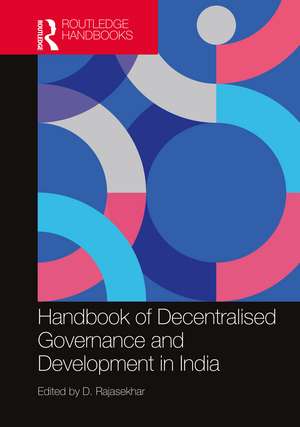Handbook of Decentralised Governance and Development in India
Editat de D. Rajasekharen Limba Engleză Paperback – 25 sep 2023
The first of its kind, this handbook will be an essential read for scholars and researchers of decentralisation and development, development studies, fiscal decentralisation, political studies, political sociology, Indian politics, Indian government, public policy and governance, political economy, South Asian studies, and South Asian politics.
Preț: 299.52 lei
Preț vechi: 341.57 lei
-12% Nou
Puncte Express: 449
Preț estimativ în valută:
57.32€ • 61.29$ • 47.79£
57.32€ • 61.29$ • 47.79£
Carte tipărită la comandă
Livrare economică 17 aprilie-01 mai
Preluare comenzi: 021 569.72.76
Specificații
ISBN-13: 9781032055145
ISBN-10: 1032055146
Pagini: 360
Ilustrații: 65 Tables, black and white; 22 Line drawings, black and white; 22 Illustrations, black and white
Dimensiuni: 174 x 246 mm
Greutate: 0.45 kg
Ediția:1
Editura: Taylor & Francis
Colecția Routledge India
Locul publicării:Oxford, United Kingdom
ISBN-10: 1032055146
Pagini: 360
Ilustrații: 65 Tables, black and white; 22 Line drawings, black and white; 22 Illustrations, black and white
Dimensiuni: 174 x 246 mm
Greutate: 0.45 kg
Ediția:1
Editura: Taylor & Francis
Colecția Routledge India
Locul publicării:Oxford, United Kingdom
Public țintă
PostgraduateCuprins
1. Decentralised Governance and Development in India: An Introduction 2. Seeing PRIs in India and their History from a Gandhian Perspective 3. The Evolution of Devolution PART 2: DIMENSIONS OF DECENTRALISATION 4.Political Decentralisation: Role of Political Parties from Colonial times 5.Rural Local Governance and Administrative Decentralisation: An Institutional Analysis 6. Fiscal Decentralisation in India: Status and Raising Issues 7. State Sub-state Level Fiscal Decentralisation in India: Theoretical Issues and Policy Options 8. Decentralised Planning in India: Challenges and Prospects 9. Implementation of PESA and Status of Panchayati Raj Institutions in Fifth Scheduled Areas of Indian States: Issues, Challenges and Ways Ahead PART 3: DECENTRALISED RURAL GOVERNANCE 10. Deliberative democracy through Grama Sabha: Progress and Issues 11. Decentralised Governance in India: The Anticipated and the Unanticipated 12. Interrogating Local Democracy: Formal and Informal local governance in Karnataka 13. Good Governance in Gram Panchayats of Kerala: Not So Good? 14. Capacity Development for Good Governance in Panchayats: Status, Effectiveness and Issues 15. ICT for Local Governance— Status, Emerging Issues and Prospects PART 4: DECENTRALISED URBAN GOVERNANCE 16. Decentralised Governance in Urban Areas: Problems and Prospects from a Socio-historical Perspective 17. Urban local Governance: Revisiting the Fundamentals 18. Intergovernmental Transfers to Urban Local Bodies in India: Issues and Directions for Reforms PART 5: SECTORAL ASPECTS OF DECENTRALISATION 19. Implementing Workfare through Decentralised Government for Poverty Reduction 20. The policy and practice of decentralised natural resource management in India 21. Devolving Rights to Forest Dwellers: Politics of Institutional Choice and Recognition in Forest Rights Act Implementation process in West Bengal, India
Notă biografică
D. Rajasekhar is the HAG Professor in Economics at the Centre for Decentralisation and Development, Institute for Social and Economic Change, Bengaluru, India. He obtained his PhD from Jawaharlal Nehru University, New Delhi, India (through the Centre for Development Studies, Trivandrum). He was Visiting Scholar at the universities of Oxford, Melbourne, Hitotsubashi, Sussex, and at the Centre for Development Research, Copenhagen. He worked extensively on decentralisation, social protection, and microfinance and served in policy bodies constituted by the government. He has published 27 books and 89 articles in national and international journals and as book chapters. His paper (co-authored) on ‘Motivating Knowledge Agents: Can Incentive Pay Overcome Social Distance?’ was published in The Economic Journal. His paper (co-authored) on ‘Collusion, Co-option and Capture: Social Accountability and Social Audits in Karnataka, India’, published in Oxford Development Studies, was awarded the Sanjaya Lall Prize for its contribution to development studies. He is currently collaborating with researchers from the London School of Economics, and the universities of Bristol, Melbourne, Tsuda, and Hitotsubashi in research relating to decentralisation and poverty reduction, delivery of public services, and social protection. His recent books include Decentralised Governance, Development Programmes and Elite Capture (2018) and Cooperatives and Social Innovations: Experiences from the Asia Pacific Region (2020).
Descriere
This handbook examines twenty-five years of decentralised governance and development in India.
